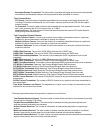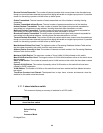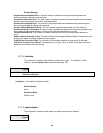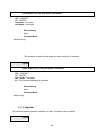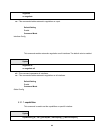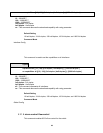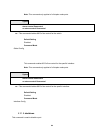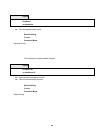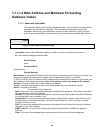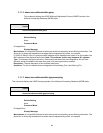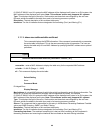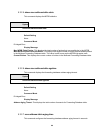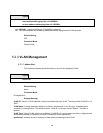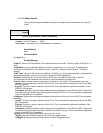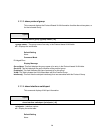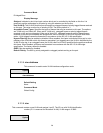
66
5.2.2 L2 MAC Address and Multicast Forwarding
Database Tables
5.2.2.1 show mac-addr-table
This command displays the forwarding database entries. If the command is entered with no
parameter, the entire table is displayed. This is the same as entering the optional all
parameter. Alternatively, the administrator can enter a MAC Address to display the table
entry for the requested MAC address and all entries following the requested MAC address.
Syntax
show mac-addr-table [{<macaddr> |all}]
<macaddr> - enter a MAC Address to display the table entry for the requested MAC address.
all – this command displays the entire table.
Default Setting
None
Command Mode
Privileged Exec
Display Message
Mac Address: A unicast MAC address for which the switch has forwarding and/or filtering information. The
format is 6 or 8 two-digit hexadecimal numbers that are separated by colons, for example
01:23:45:67:89:AB. In an IVL system the MAC address will be displayed as 8 bytes. In an SVL system, the
MAC address will be displayed as 6 bytes. Note: This software version only supports IVL systems.
Interface: The port on which this L2 MAC address was learned.
if Index: This object indicates the if Index of the interface table entry associated with this port.
Status: The status of this entry.
The meanings of the values are:
Static: The value of the corresponding instance was added by the system or a user when a static MAC
filter was defined. It cannot be relearned.
Learned: The value of the corresponding instance was learned by observing the source MAC addresses
of incoming traffic, and is currently in use.
Management: The value of the corresponding instance (system MAC address) is also the value of an
existing instance of dot1dStaticAddress. It is identified with interface 3/1 and is currently used when
enabling VLANs for routing.
Self: The value of the corresponding instance is the address of one of the switch’s physical interfaces
(the system’s own MAC address).
GMRP Learned: The value of the corresponding instance was learned via GMRP and applies to
Multicast.
Other: The value of the corresponding instance does not fall into one of the other categories.



